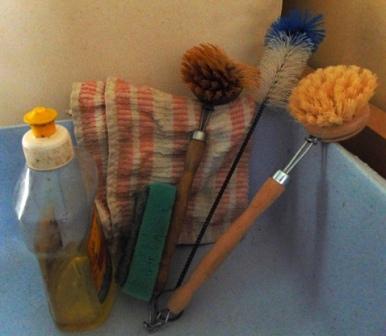Today, there are masses of products and tools to clean.
Some simple practical tips:
 Dry dirt, you must first remove dry, not first wet it. That gives a lot of unnecessary gunk, you smear the dirt further. Work from clean to dirty and from high to low.
Dry dirt, you must first remove dry, not first wet it. That gives a lot of unnecessary gunk, you smear the dirt further. Work from clean to dirty and from high to low.
Incidentally, if you’re wet cleaning (washing, cleaning, cleaning windows) it also only looks clean after you rubbed it all dry back. House dust contains an average of more than 2,000 species of fungi and 7,000 different bacteria.
If you fold a cleaning cloth 3 x you have 16 clean surfaces that you can use systematically one at a time. That is certainly 5x more efficient than any pleated and 10 x more convenient than a fumbled up cloth.
Dirty stains on clothes, a dirty collar of a shirt... can you rub with warm suds a few hours before washing. that may even be a day in advance (12 to 24 hours, do not allow it to dry out!). Then you get them easier cleaned.
You can make brooms from birch branches, heather (Calluna) and gorse (cytissus), etc.
A soft broom for indoor can be made of gold-of -pleasure (Camelina sativa, the seeds also provide oil for cooking or lamp oil) or flax.
Natural scourer can be made of horsetail. Just roll some stems together into a ball. Even the Romans used it already. Or a tangle of rope or raw fiber. (See also sponge, at cucumber text: sponge cucumber (Luffa aegyptiaca) known as Loofah Gourd, sponge gourd, Egyptian cucumber). Make scourers from sisal rope. Knit a rectangle, make a bag out of it. You can fill it with rope or old strips of cloth. The stalks of the Camelina sativa plant are suitable for making brooms and scouring pads.
I hate cleaning. Six months later you have to start again. (Joan Rivers)
To clean further, we use tools and techniques of which the efficiency depends on
- temperature: hot water washes better than cold, dissolves fat better, molecules move more and bind rapidly;
- duration or time: stubborn dirt cannot be rinsed, put it one hour, or one day to soak;
- the abrasive: a grater scratches more and rougher off than sandpaper or sponge;
- the (chemical) product: can be very aggressive, so you need protective gloves and mask. Water also works. Suds even better. And some alcohol (dash of vinegar) also helps;
- mechanical movement: fondling twice has less effect than ten times firmly scouring.
Keep clean and dirty water separated as much as possible. With dirty water you cannot clean or wash. With a dirty cloth neither.
Wooden kitchenware (boards, bowls, spoons..) you have to let dry well after washing. If you store them moist, they can go moldy.
That also goes for other organic material like leather, sponge or cloth.
Occasionally a thorough turn to clean wooden shelves and spoons: pour hydrogen peroxide (drugstore, ..) over it and spread it over the entire surface. Leave it for a few minutes. It will kill all bacteria. Rinse and dry.
She: "I do things at home that you do not even notice!" "What then?" "There you are!"
